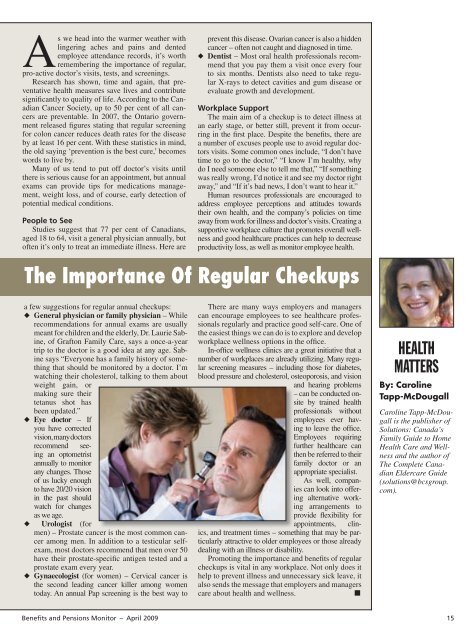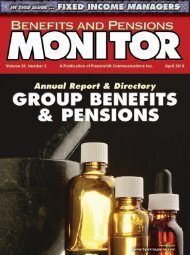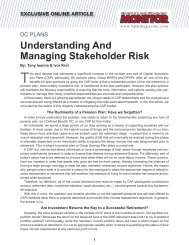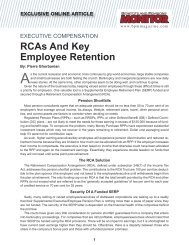April - Benefits and Pensions Monitor
April - Benefits and Pensions Monitor
April - Benefits and Pensions Monitor
Create successful ePaper yourself
Turn your PDF publications into a flip-book with our unique Google optimized e-Paper software.
As we head into the warmer weather with<br />
lingering aches <strong>and</strong> pains <strong>and</strong> dented<br />
employee attendance records, it’s worth<br />
remembering the importance of regular,<br />
pro-active doctor’s visits, tests, <strong>and</strong> screenings.<br />
Research has shown, time <strong>and</strong> again, that preventative<br />
health measures save lives <strong>and</strong> contribute<br />
significantly to quality of life. According to the Canadian<br />
Cancer Society, up to 50 per cent of all cancers<br />
are preventable. In 2007, the Ontario government<br />
released figures stating that regular screening<br />
for colon cancer reduces death rates for the disease<br />
by at least 16 per cent. With these statistics in mind,<br />
the old saying ‘prevention is the best cure,’ becomes<br />
words to live by.<br />
Many of us tend to put off doctor’s visits until<br />
there is serious cause for an appointment, but annual<br />
exams can provide tips for medications management,<br />
weight loss, <strong>and</strong> of course, early detection of<br />
potential medical conditions.<br />
People to See<br />
Studies suggest that 77 per cent of Canadians,<br />
aged 18 to 64, visit a general physician annually, but<br />
often it’s only to treat an immediate illness. Here are<br />
prevent this disease. Ovarian cancer is also a hidden<br />
cancer – often not caught <strong>and</strong> diagnosed in time.<br />
◆ Dentist – Most oral health professionals recommend<br />
that you pay them a visit once every four<br />
to six months. Dentists also need to take regular<br />
X-rays to detect cavities <strong>and</strong> gum disease or<br />
evaluate growth <strong>and</strong> development.<br />
Workplace Support<br />
The main aim of a checkup is to detect illness at<br />
an early stage, or better still, prevent it from occurring<br />
in the first place. Despite the benefits, there are<br />
a number of excuses people use to avoid regular doctors<br />
visits. Some common ones include, “I don’t have<br />
time to go to the doctor,” “I know I’m healthy, why<br />
do I need someone else to tell me that,” “If something<br />
was really wrong, I’d notice it <strong>and</strong> see my doctor right<br />
away,” <strong>and</strong> “If it’s bad news, I don’t want to hear it.”<br />
Human resources professionals are encouraged to<br />
address employee perceptions <strong>and</strong> attitudes towards<br />
their own health, <strong>and</strong> the company’s policies on time<br />
away from work for illness <strong>and</strong> doctor’s visits. Creating a<br />
supportive workplace culture that promotes overall wellness<br />
<strong>and</strong> good healthcare practices can help to decrease<br />
productivity loss, as well as monitor employee health.<br />
The Importance Of Regular Checkups<br />
a few suggestions for regular annual checkups:<br />
◆ General physician or family physician – While<br />
recommendations for annual exams are usually<br />
meant for children <strong>and</strong> the elderly, Dr. Laurie Sabine,<br />
of Grafton Family Care, says a once-a-year<br />
trip to the doctor is a good idea at any age. Sabine<br />
says “Everyone has a family history of something<br />
that should be monitored by a doctor. I’m<br />
watching their cholesterol, talking to them about<br />
weight gain, or<br />
making sure their<br />
tetanus shot has<br />
been updated.”<br />
◆ Eye doctor – If<br />
you have corrected<br />
vision, many doctors<br />
recommend seeing<br />
an optometrist<br />
annually to monitor<br />
any changes. Those<br />
of us lucky enough<br />
to have 20/20 vision<br />
in the past should<br />
watch for changes<br />
as we age.<br />
◆<br />
Urologist (for<br />
men) – Prostate cancer is the most common cancer<br />
among men. In addition to a testicular selfexam,<br />
most doctors recommend that men over 50<br />
have their prostate-specific antigen tested <strong>and</strong> a<br />
prostate exam every year.<br />
◆ Gynaecologist (for women) – Cervical cancer is<br />
the second leading cancer killer among women<br />
today. An annual Pap screening is the best way to<br />
There are many ways employers <strong>and</strong> managers<br />
can encourage employees to see healthcare professionals<br />
regularly <strong>and</strong> practice good self-care. One of<br />
the easiest things we can do is to explore <strong>and</strong> develop<br />
workplace wellness options in the office.<br />
In-office wellness clinics are a great initiative that a<br />
number of workplaces are already utilizing. Many regular<br />
screening measures – including those for diabetes,<br />
blood pressure <strong>and</strong> cholesterol, osteoporosis, <strong>and</strong> vision<br />
<strong>and</strong> hearing problems<br />
– can be conducted onsite<br />
by trained health<br />
professionals without<br />
employees ever hav-<br />
ing to leave the office.<br />
Employees<br />
requiring<br />
further healthcare can<br />
then be referred to their<br />
family doctor or an<br />
appropriate specialist.<br />
As well, compan-<br />
ies can look into offering<br />
alternative working<br />
arrangements to<br />
provide flexibility for<br />
appointments, clinics,<br />
<strong>and</strong> treatment times – something that may be particularly<br />
attractive to older employees or those already<br />
dealing with an illness or disability.<br />
Promoting the importance <strong>and</strong> benefits of regular<br />
checkups is vital in any workplace. Not only does it<br />
help to prevent illness <strong>and</strong> unnecessary sick leave, it<br />
also sends the message that employers <strong>and</strong> managers<br />
care about health <strong>and</strong> wellness.<br />
■<br />
HEALTH<br />
MATTERS<br />
By: Caroline<br />
Tapp-McDougall<br />
Caroline Tapp-McDougall<br />
is the publisher of<br />
Solutions: Canada’s<br />
Family Guide to Home<br />
Health Care <strong>and</strong> Wellness<br />
<strong>and</strong> the author of<br />
The Complete Canadian<br />
Eldercare Guide<br />
(solutions@bcsgroup.<br />
com).<br />
<strong>Benefits</strong> <strong>and</strong> <strong>Pensions</strong> <strong>Monitor</strong> – <strong>April</strong> 2009<br />
15









